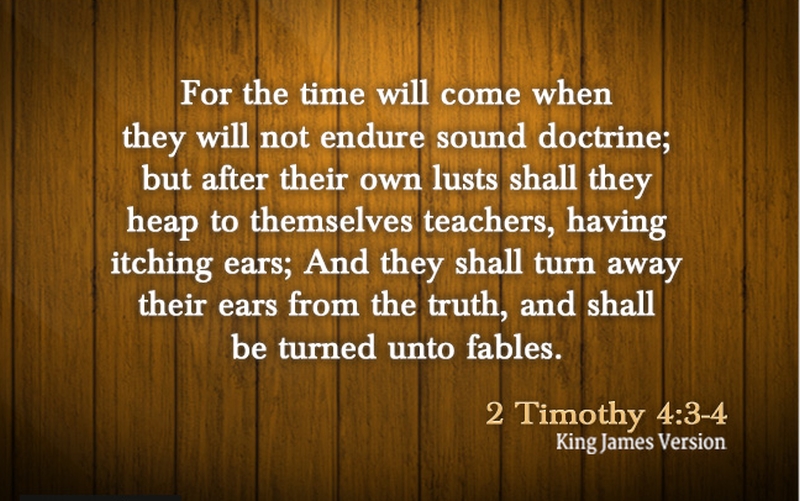One of the most common and pervasive myths of modern church doctrine is the myth that “all things are pure” or that “all things are permissible”. It is based on several verses which seem to allude to the idea that the Old Testament laws are now passed away and that now all things are “covered under the blood of Jesus” allowing all things to be permissible. However, this ideology does not hold up with the rest of scripture, even the very passages.
You cannot cherry-pick scripture or twist it out of context and make it into a doctrine. This is what is happening however with this grace doctrine which has become so broad that many are teaching, directly or indirectly, that Christians no longer have eternal consequences for not obeying the Word of God, especially when it comes to Old Testament laws.
For example, a common argument is that the Sabbath no longer has to be followed, because it is Jewish “myth”, or because the “old covenant has passed away”. However, the Bible never says the old covenant (the laws from the Old Testament) has passed away, but quite the contrary, Jesus Himself said that all the laws of the Old Testament hold strong and not even a word of the law will ever change.
The verses in question with regards to this cherry-picking of scripture and twisting out of context include Titus 1:15-16, Romans 14:1-9, 1 Corinthians 10:23, and Acts 10:14-15.
Titus 1:15-16

16 They profess that they know God; but in works they deny him, being abominable, and disobedient, and unto every good work reprobate.” (Titus 1:15-16)
People have used this verse to say that all things are pure, no thing is condemnable any longer. People have attempted to say that this means that the “old covenant” is passed away and now there is a new covenant; that now it’s ok to do whatever you want, without condemnation.
However, it seems that this entire verse has been wholly taken out of context, because it does not at all mean that impure things are pure – quite the contrary! To a discerning mind it can be clearly read: to the pure (only), all things are pure.
Purity is a prerequisite to “all things being pure”. Paul was not saying that to impure people now suddenly they are made pure. In the very same sentence, Paul confirms this – to “them that are defiled and unbelieving is nothing pure”.
Further, immediately following, Paul elaborates how impure people are abominable and disobedient. Paul does not say that these disobedient people are made pure, but completely the opposite! Paul condemns impurity and disobedience and commands people to be pure, to be obedient. In fact, not just a little, but in “all things”.
No, Paul was absolutely not saying that all impure things are made pure; that is completely a false context spoken by those who never truly read, comprehended, and understood this verse. The entire verse is about a command to be pure in all things, condemning sin and disobedience. Anyone with a logical and discerning mind free from the false doctrines of men, can clearly see that this entire verse is a condemnation of disobedience to God’s laws.
Romans 14:1-9

3 Let not the one who eats despise the one who abstains, and let not the one who abstains pass judgment on the one who eats, for God has welcomed him.
4 Who are you to pass judgment on the servant of another? It is before his own master that he stands or falls. And he will be upheld, for the Lord is able to make him stand.” (Romans 14:1-9)
It is clear here that what Paul is talking about is the eating of meat. Some people at the time believed they were only allowed to eat vegetables. Paul said, eating meat is fine, but we have no right to judge each other for believing that eating meat was not acceptable, or vice-verse.
However, unconditional grace activists try to add to this verse by suggesting that it caused the entire Old Testament law to pass away. However, in fact this did not even cause the Old Testament laws about food to pass away.
All Paul said was that some people believed they couldn’t eat meat, but there was no biblical precedent for this, so that eating meat was fine. It has nothing to do with all the Old Testament laws.
Acts 10:14-15

15 And the voice spake unto him again the second time, What God hath cleansed, that call not thou common.” (Acts 10:14-15)
Common. What does this mean? “Common” here is the word κοινoν (koinon). Koinon means “profane; dirty, unclean, unwashed.”
People have used this to mean that now all Old Testament laws are passed away. However, that is unfounded. Once again, it is taken out of context.
It says “what God has made clean”. God was preparing Peter’s heart to minister to a Roman, Cornelius, who was about to come to his house. Verse 28 shows the truth about the meaning behind this verse and Peter’s vision.
“28 You yourselves know how unlawful it is for a Jew to associate with or to visit anyone of another nation, but God has shown me that I should not call any person common or unclean.”
Peter interpreted his vision for us. God was giving a metaphor about how God has cleansed other nations and that now other nations can become God’s people, not just Israel, and the sacrificial laws. God’s chosen people are no longer Israel alone; they are all who accept Him. We also do not have to sacrifice animals anymore, because Jesus completed his sacrifice on the cross for our sins.
The passages above have absolutely nothing to do with the “old covenant passing away”. To say that is to add to the Bible and therefore to commit heresy.
1 Corinthians 10:23

“23 “All things are lawful for me”, but all things are not expedient: “all things are lawful for me”, but all things edify not.” (1 Corinthians 10:23)
Once again, people indoctrinated into heretical modern church doctrines love to use this verse to support their unbiblical ideology that the “old covenant” has passed away. They say that because “all things are lawful”, now we no longer need to follow the laws found in the Old Testament.
However, that cannot be possible. If Paul really meant this as a blanket statement to cover “all” things, then it must have included commandments such as not to lie or steal or murder or commit idolatry or adultery, surely? Certainly not. If, then, it is still impure to murder or worship other false gods, then it means with certainty that “all things pure” is meant in a relative context. It cannot mean “all things” including all the laws in the Old Testament.
Therefore, the question that remains is just where to draw this line. What was Paul referring to when he said “all things are lawful”? He didn’t mean it is lawful to murder and rape and pray to idols. So since all things are not lawful, what did Paul really mean by this statement?
As usual, one must merely look to the immediately preceding and following verses to discover the context of what Paul was really saying. In fact, the whole chapter provides context. This chapter is about a warning to Israel to abstain from idolatry.
To understand, we must look at the preceding verses 14 to 22:
18 Consider the people of Israel: are not those who eat the sacrifices participants in the altar? 19 What do I imply then? That food offered to idols is anything, or that an idol is anything? 20 No, I imply that what pagans sacrifice they offer to demons and not to God. I do not want you to be participants with demons. 21 You cannot drink the cup of the Lord and the cup of demons. You cannot partake of the table of the Lord and the table of demons. 22 Shall we provoke the Lord to jealousy? Are we stronger than he?” (1 Corinthians 10:14-22)
So, immediately we can see that immediately before Paul said “All things are lawful”, he had said, “You cannot drink the cup of the Lord and the cup of demons. You cannot partake of the table of the Lord and the table of demons.” So what is it then? All things are lawful or all things are not?

All things are not lawful. Something that is often if not entirely missed is that, once again, “All things are lawful” are not the words of Paul! In fact, Paul merely quoted the corrupt Corinthians. If you open your Bible and look, “All things are lawful” is in quotes, in the Bible.
This is because Paul was not saying that all things are lawful, but the complete opposite! The Corinthians thought all things are lawful. Paul disagreed.
The NIV adds “you say”, “‘I have the right to do anything,’ you say”. Because Paul was merely quoting what the Corinthians were saying.
Here, Paul clearly was contradicting, in a graceful way. Instead of saying, “hey, you are wrong!” he instead provided evidence why they are wrong. All things are not lawful, of course. Paul knew that, and Paul said that. “Everything is lawful for me” – is murder lawful? No? How can you say murder is not lawful and at the same time use this verse to say that it provides support for all things to be lawful?
Clearly, there are things that are not lawful. Both statements Paul put in quotes – the Corinthians were the ones who believed all things were lawful – not Paul. Like Paul does often, Paul quotes the corrupt church beliefs and then proceeds to destroy the argument with biblical evidence and sound logic.
All things are not lawful. Paul never said all things are lawful, or pure, or holy. The entire Bible is evidence that all things are not lawful or holy or pure. The blood of Jesus can cover or erase sins but it does not make sinful things holy. The blood of Jesus does not make it permissible to worship anyone other than God, or to kill your neighbor. All things are not lawful. All things are not holy. All things are not pure.
To say that all things are now lawful and the “old covenant is passed away” is a fallacy, even an abominable heresy.
It is this very lie that “all things are now pure, washed by the blood of Jesus” that is the foundation for the heretical doctrine of unconditional grace. He who has ears, let him hear. Only God can change your heart, and God will only give you discernment if you come to Him and answer His call.
Those who cannot hear will be deaf to these words, you will read but will not comprehend, because your ears itch for teachings which tell you what you want to hear, regardless of its biblical accuracy.
Twisted, corrupted, fallacious, illogical, unfounded, erroneous, misread, misinterpreted falsehoods and outright lies and complete misreading of scripture that has led possibly millions astray and to hell. He who has ears, let him hear, and may you ask God for the discernment to know the truth.

As you can see above, the false doctrine that “all things are pure” and now we don’t have to follow the Old Testament laws, is not at all supported by the passages commonly used to support it. All things are not pure, and the Bible, even the very passages, are support for the idea that we must follow God’s laws.
The only covenant that passed away was the covenant to Israel being God’s chosen people. Now, all nations can partake in God’s forgiveness and mercy, as Acts 10 affirms.
However, these passages say nothing about any Old Testament laws being nullified or voided. Rather, even Jesus said, “For verily I say unto you, Till heaven and earth pass, one jot or one tittle shall in no wise pass from the law, till all be fulfilled.” (Matthew 5:18)
Nothing, nothing at all from the law will pass. Jesus said that all the Old Testament laws will continue, until even heaven and earth pass away.
Only pure things are pure, only clean things are clean. People who live in sin are not pure or clean. People who continually and intentionally break God’s laws are not pure, and not clean. There is no Unconditional Grace that allows people to continue sinning and still receive salvation. To say so is heresy, and to promote the false doctrine of unconditional grace is heretical.
Therefore, as Jesus said, “Be perfect, therefore, as your heavenly Father is perfect” (Matthew 5:48). This may be a hard word, because sin is so entrenched and ingrained in your very being. You must pray for God to transform you and through the power of the Holy Spirit to give you the strength and power to overcome the sin in your life.
Repent, and turn from your sins once and for all, lest God would say to you on that day, “‘I never knew you. Away from me, you evildoers!'” (Matthew 7:23)



